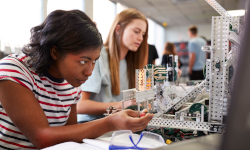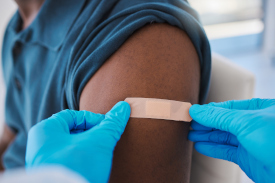 Hill Update: Congress Averts Government Shutdown
Hill Update: Congress Averts Government Shutdown
President Biden signed the Further Continuing Appropriations and Other Extensions Act (H.R. 6363) last week, thus preventing a government shutdown. The bill sets a January 19 deadline for Congress to pass the FY24 Agriculture-FDA, Energy and Water, Military Construction-VA, and Transportation-HUD bills and a February 2 deadline for the remaining eight appropriations bills. The bill does not include any supplemental funding or cuts to existing levels of funding.
The continuing resolution increases pressure on Congress to pass FY24 appropriations bills by the January 19 and February 2 deadlines. As a reminder, the House has passed seven of the 12 annual government-funding bills, while the Senate has passed only three.
Last week, the House debated the FY24 Labor-HHS-Education spending bill (H.R. 5894) but delayed a floor vote until after Thanksgiving. The bill, which faces tough odds for passage, cuts funding for the National Institutes of Health and the Department of Education and eliminates funding for several student aid programs, including the Federal Work-Study program and the Federal Supplemental Educational Opportunity Grant program. Last week, the House also voted to reject a rule that would have allowed the FY24 Commerce-Justice-Science bill (H.R. 5893) to proceed to the floor for consideration.
 New Data Show Significant Increase in Number of International Students Studying at U.S. Universities
New Data Show Significant Increase in Number of International Students Studying at U.S. Universities
New data released last week by the State Department’s Bureau of Educational and Cultural Affairs and the Institute of International Education show that the total number of international students in the United States in the 2022-23 academic year (1,057,188) was 12% higher than in the previous academic year. According to The Chronicle of Higher Education, this represents “the largest single-year growth in more than four decades.”
The Open Doors 2023 Report on International Educational Exchange shows that the increase in international students was largely driven by increases in enrollment at the graduate level (+21%) and increases in enrollment from India (+35%). China, however, still sent the largest number of international students (289,526) followed by India (268,923). The data also show that 55% of international students majored in STEM fields in 2022-23. According to an IIE press release, “International students accounted for 6% of the total U.S. higher education population and contributed nearly $38 billion to the U.S. economy.” IIE CEO Allan E. Goodman said that data from the report reinforce the fact that the United States “remains the destination of choice for international students wishing to study abroad.”
 FEATURED RESOURCE: International Students and American Competitiveness
FEATURED RESOURCE: International Students and American Competitiveness
 Monica Bertagnolli Confirmed as Next National Institutes of Health Director
Monica Bertagnolli Confirmed as Next National Institutes of Health Director
Earlier this month, the Senate confirmed Monica Bertagnolli as the next director of the National Institutes of Health. Bertagnolli comes to the NIH from the National Cancer Institute; she has previously served as the Richard E. Wilson Professor of Surgery at Harvard Medical School and a surgeon at Brigham and Women’s Hospital in Boston. AAU President Barbara. R. Snyder released a statement welcoming her confirmation.
Bertagnolli faces a range of challenges in her new role, including budgetary concerns as well as diminishing public trust in science. During her confirmation hearing, Bertagnolli noted that her three main priorities as NIH director would be to make treatments “available and affordable;” to improve the efficiency and diversity of clinical trials and research; and to “restore faith and trust in our nation’s top scientists.”
 AAU Institutions Receive Grants to Support Inclusive STEM Education
AAU Institutions Receive Grants to Support Inclusive STEM Education
Last week, the Howard Hughes Medical Institute announced that it is awarding $2.5 million each over five years to six universities as part of its Driving Change initiative designed “to connect research universities that are working to build inclusive learning environments for students in science, technology, engineering, and mathematics (STEM).” Two of the six universities are AAU members (Rice University and the University of California, Los Angeles). This is the second round of awards HHMI has made under this initiative; The Ohio State University and the University of Virginia were among those who received awards last year.
The Driving Change initiative is designed to support institutions that are creating long-lasting change to make STEM education more inclusive and to enable students of all backgrounds to excel in STEM. According to HHMI, “This year’s awardees are recognized for developing culture change efforts that include new department-based equity action plans, living-learning communities, holistic advising programs, and civic engagement programs, among many other undertakings.” The awardees are among the 38 institutions that form the Driving Change Learning Community, which works together “to create inclusive environments, support student success, and recognize institutional practices that are barriers to inclusion.” Fifteen of the 38 institutions in the Learning Community are AAU members.
 ICYMI: IAAU to Establish Learning Community on Effective Teaching Evaluation
ICYMI: IAAU to Establish Learning Community on Effective Teaching Evaluation
NSF Invests $10.9 Million to Help Develop Safe AI Technologies
The National Science Foundation announced late last month that it is investing $10.9 million “to support research that will help ensure advances in artificial intelligence go hand in hand with user safety.” The investments are part of the NSF’s Safe Learning-Enabled Systems program, which fosters “foundational research that leads to the design and implementation of safe computerized learning-enabled systems – including autonomous and generative AI technologies – that are both safe and resilient.”
The majority of the NSF grants are going to AAU member universities, including Arizona State University; Harvard University; Princeton University; The Ohio State University; the University of California, Berkeley; the University of California, Los Angeles; the University of Illinois Urbana-Champaign; the University of Michigan; the University of Pennsylvania; the University of Virginia; and the University of Wisconsin-Madison.
 Leading Research Universities Report to Return on Monday, December 4
Leading Research Universities Report to Return on Monday, December 4
Due to the Thanksgiving holiday, the Leading Research Universities Report will take a break from publication next week. The next edition will be released on Monday, December 4.
News of Interest
CNN: No Place in the U.S. Is Safe from the Climate Crisis, But a New Report Shows Where It’s Most Severe – According to a new report, Americans can increasingly feel the effects of climate change and that the impact will worsen “over the next 10 years with continued fossil fuel use.” The interagency Fifth National Climate Assessment, “a congressionally mandated report,” found that “no part of the U.S. is truly safe from climate disasters.” The report also warned of the significant dangers of water insecurity and drought in the American Southwest. The report’s Southwest chapter, led by Arizona State University climate scientist Dave White, found that “the region was significantly drier from 1991 to 2020 than the three decades before.”
Nature: United States and India Are Becoming Science Partners of Choice – U.S. institutions are increasingly looking to Indian institutions to forge new research partnerships. One effort is the India-U.S. Global Challenges Institute being set up by AAU and the Council of Indian Institutes of Technology, which will “bring together leading research and higher-education institutions from the two nations in a virtual network to collaborate on joint research programs.” But forging such partnerships comes with challenges; institutions must navigate “significant structural and cultural differences in the countries’ higher-education systems, as well as regulatory and policy hurdles.”
The Chronicle of Higher Education: How Do Humanities Majors Fare in the Work Force? – A new report from the American Academy of Arts and Sciences disputes the notion that “humanities degrees are a waste of money.” The data show that humanities degrees generally increase the earning potential of workers compared to high school diplomas; that “humanities majors aren’t largely unemployed;” and that “their earnings are comparable to or better than the salaries of workers who majored in most non-humanities fields.”
CNN: Americans’ Trust in Science Declining, Pew Survey Says – A new survey from the Pew Research Center shows that “the percent of American adults who say science has a ‘mostly positive’ effect on society fell to 57%, down 8 percentage points since November 2021 and 16 percentage points since just before the pandemic.” The decline in trust is greater among Republicans than among Democrats. Nevertheless, 78% of Americans still support government investments in scientific research, with over half considering “it ‘very important’ for the United States to be a world leader in scientific achievements.”
WCMH: Honda Investing $15 Million in Ohio State Battery Cell Research Center – Honda is investing $15 million in a facility at The Ohio State University dedicated to “battery cell research, production, and education.” The project, which is also receiving $4.5 million in federal funding from the National Institute of Standards and Technology, “will act as a pipeline of industry talent while also attracting electric vehicle battery manufacturing and supply chain businesses.”
Forbes: The 2024 U.S. Rhodes Scholars Are Announced; Harvard Leads with Nine – Out of the 32 students chosen as the 2024 U.S. Rhodes Scholars, nine are from Harvard University. The award is “considered to be the most prestigious international scholarship for American college graduates” and allows students to pursue studies at the University of Oxford in England. In total, 21 of the 32 students selected this year as U.S. Rhodes Scholars are from AAU schools.
Featured Research

Study Finds COVID Vaccine Mandates Significantly Reduce Infection Rates on College Campuses
Researchers from The Ohio State University College of Medicine examined data gathered from six Ohio State campuses and found that COVID-19 vaccine mandates were “highly effective at reducing the spread of the virus and increasing immunity in a university setting.” The research found that “masking, isolation, and antibodies from getting sick weren’t enough to decrease infection rates.”

The World Has a Food-Waste Problem. Can This Wireless Tech Help Fix It?
Researchers at Princeton University and Microsoft Research have developed a new tool that uses high-frequency wireless technology to “determine fruit quality, piece by piece” and “gives suppliers a way to sort fruit” based on ripeness. The tool “promises to help cut food waste by optimizing distribution: good fruit picked from bad bunches, ripe fruit moved to the front of the line.”
From Our Feeds

AAU’s new “Immigrant Spotlight” series highlights the incredible contributions of immigrant researchers at U.S. universities. Our next article in the series features University of California, Riverside’s Katayoon Dehesh, a pioneer in the field of plant stress biology. Born in Iran, Dehesh is the director of the Institute for Integrative Genome Biology and the Ernst and Helen Leibacher Endowed Chair in Botany and Plant Sciences at UC Riverside. Read more about Dehesh’s work and her journey on the AAU website.